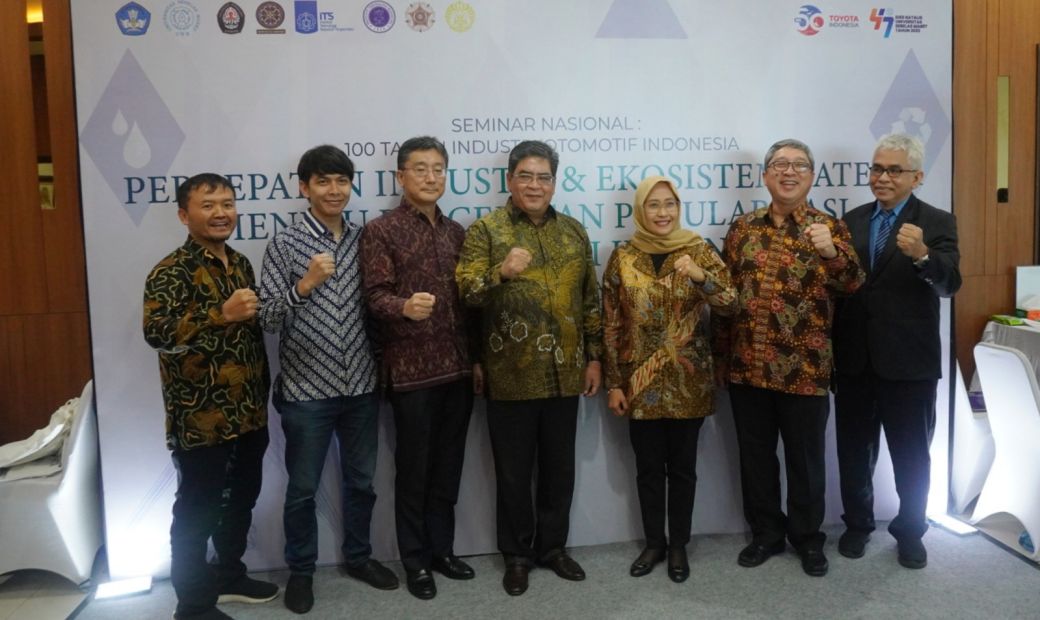Please fill in some of the data provided below to receive the latest Toyota-related news and information in your email.


The Indonesian automotive industry is undergoing a transformation towards an industrial era that carries the spirit of decarbonization and electrification. Not only through the production of electric vehicles, the national automotive industry is also expected to be able to implement the spirit of decarbonization in the production process, and participate in the development of the electrification ecosystem as the infrastructure to accelerate the electrification population in Indonesia.
Indonesia has a big challenge to be at the forefront of automotive electrification in the ASEAN region, competing against countries with other large automotive industries such as Thailand and Vietnam. Therefore, Indonesia must take advantage of the great automotive potentials in the era of electrification from upstream to downstream carefully in an integrated automotive industry policy and development strategy that allows the acceleration of all electrification technologies.
Upstream, Indonesia has various natural resources, both for battery development and for the energy mix. Indonesia also has a large automotive industry capacity. Downstream, Indonesia's automotive market is bigger than other countries in ASEAN.
"The interests of all shareholders and stakeholders, starting from the level of government, academia, industry, to the market must be involved. This collaboration will encourage the creation of a comprehensive strategy to accommodate the diverse needs of electrified vehicles and other environmentally friendly vehicles while taking into account the goals of decarbonization, while ensuring sustainable economic growth.” said Bob Azam, PT TMMIN's Director of External Relations.
Batteries as Part of an Optimal Electrification Ecosystem
With the world's largest nickel reserve potential, Indonesia has the potential to become a major producer of nickel-based finished goods, such as electric vehicle batteries. This means that Indonesia has a great opportunity to develop the battery industry, which incidentally is one of the main ecosystems of the electrification industry. In addition, the development of the electrification battery industry will also increase Indonesia's attractiveness as a destination country for derivative industries that use battery raw materials. Mastery of battery development is an important component in creating Indonesia's position as the leader in the electrification era.
The development of the battery industry certainly requires creating a market for these batteries so that they can attract more investment and make Indonesia one of the important battery producers in the global market. Toyota itself is committed to supporting the creation of this battery market through a Multipathway Strategy Approach in which Toyota introduces and provides a variety of electrified vehicle technologies that use batteries for consumers in Indonesia, from Hybrid Electric Vehicles (HEV), Plug-in Hybrid Electric Vehicles (PHEV), Battery Electric Vehicle (BEV), to Fuel Cell Electric Vehicle (FCEV). The hope is that with more and more electrified vehicles available and attracting consumer interest, the acceleration of demand for batteries produced by Indonesia will be even greater.
National Seminar on Battery Ecosystem and Industry Development
Of course, the strategies for the battery industry, automotive manufacturing industry, and integrated market development are a common challenge for the Government, related industries, and academia. As part of the national automotive industry, Toyota Indonesia is committed to always synergizing with the government and academia through Triple Helix collaboration (government, academia and industry) in aligning understanding so that the transformation of the automotive industry in the electrification era in general, and the battery industry in particular, can run seamlessly.
The role of academics is needed to convey technological innovations that can be applied to the transformation process. Meanwhile, from the government's side regarding commitment support through various policies for the development of electrification ecosystems.
In connection with these efforts, Toyota Indonesia together with various parties who are members of the Triple Helix collaboration participated in a series of national seminars entitled "100 Years of the Indonesian Automotive Industry, Realizing Indonesia's Net-Zero Emissions (NZE) which took place at the Sebelas Maret University Campus (UNS), Solo, on Tuesday (7/3).
Carrying the theme "Accelerating the Development of the Industry and Battery Ecosystem in Indonesia Towards an Electrified Population", this seminar wanted to convey a message about the importance of developing the battery industry and ecosystem in an effort to accelerate the xEV population in Indonesia.
The 5th series of this national seminar was attended by speakers from the government, academia and industry, namely the Minister of Energy and Mineral Resources (ESDM) Sripeni Inten Cahyani, Deputy President Director of PT TMMIN Nandi Julyanto, Main Director of PT Indonesia Battery Corporation (IBC) Totok Nugroho, UNS Rector Prof. Jamal Wiwoho, Managing Director of Deloitte, and academician Khoirunurrofik (LPEM-UI), and Prof. Agus Purwanto and Prof. Wahyudi Sutopo, from UNS Solo.
This seminar discussed the need for strategies and breakthroughs as a common understanding to support efforts to accelerate the popularization of the xEV market, including through developing a battery industry ecosystem for competitive batteries, implementing incentive policies from the government that are not only focused on BEVs but also on PHEV and HEV , as well as the gradual development of non-fiscal measures in line with fiscal incentives.
Development of Skilled and Expert Human Resources for the Electrification Industry Ecosystem
Toyota Indonesia realizes that the electrification industry requires an ecosystem that is much different from conventional vehicles. Not only in terms of supporting infrastructure, but also in terms of the supply chain and human resources.
Therefore, on the occasion of this National Seminar, on Monday, March 6, Toyota donated a hybrid engine & 3 core component set (transaxle, battery, & CPU) to UNS. This donation was given by Bob Azam who was received directly by the Dean of the UNS Faculty of Engineering.
Toyota Indonesia considers it important to improve HR skills and expertise to build a reliable ecosystem for the future development of the xEV industry, including the development of the battery industry. HR development is one of the main pillars of the industry, including in the transformation of the national automotive industry towards an era of carbon neutrality and the xEV industry. "We have to be able to ensure that Indonesian human resources have the skills and expertise to face the electrification era, including in the development of its ecosystem," said Bob Azam.
#Elektrifikasi, #Electrified Vehicle, #Carbon Neutral, #Karbon Netral, #Net Zero EmissionMedia/Journalist Contact : tmmin.pr@toyota.co.id
Non Media / Non Journalist Contact : admin.website@toyota.co.id

© 2024 Toyota Motor Manufacturing Indonesia. All Rights Reserved.
